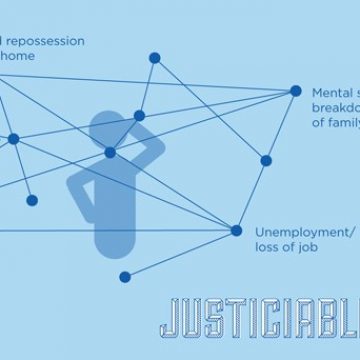The majority of minor legal problems in Canada go unresolved, according to a report published this month by the Canadian Forum on Civil Justice (CFCJ). The statistics in the report are clear: 12 million Canadians experience at least one legal problem every three years and yet, 20 percent of those people take no meaningful action to resolve their issues and more than 65 percent “think that nothing can be done, are uncertain about their rights, do not know what to do, think it will take too much time, cost too much money or are simply afraid.”
The most common unresolved problems are basic civil and family matters, such as estate regulations, custody arrangements or housing disputes. The report claims that the Canadian legal system needs to recognize that the courtroom is unnecessary for the minor issues, dubbed “justiciable problems” by the CFCJ, most people face. Many problems can be solved simply by offering access to low-cost resources, such as a hotline where the public can ask legal questions when they get confused or, for more complex disputes, by using mediators.
The legal system, however, has been slow to react to the lack of civil and family services, says Trevor Farrow, chair of the CFCJ, in an interview with Precedent.
“A significant amount of spending is on the criminal side of the justice system when it comes to policing, corrections and legal aid,” he says. “The strange thing about that calculus is that the problems that touch more and more Canadians every day are in the field of civil and family law.”
The report recommends several tools that can keep civil and family problems out of courtrooms.
One suggestion is to mediate civil disputes online. The report points out that similar programs exist in the corporate world: eBay provides a free web-based forum that helps users resolve issues on their own. If no solution is reached, eBay subsidizes the cost of a professional mediator so that users only pay $15. The report argues a similar system could resolve civil legal matters.
British Columbia, for instance, already settles some tenant-landlord disputes by telephone. In an interview with Precedent, Mark Benton, executive director of the Legal Services Society, British Columbia’s legal aid provider, and a member of the action committee, says that after hearing from both the tenant and the landlord over the phone, the arbitrator makes a legally binding decision.
He says that for minor legal issues, these kinds of programs cost less and solve problems “within days or weeks, rather than in months or years.”
Solving a legal issue promptly can prevent it from creating more serious and expensive problems down the road, says the report. Failing to help people struggling with debt or housing, for example, could put them at risk of “social exclusion, which may in turn lead to a dependency on government assistance.”
Ultimately, it is up to provincial governments, who are responsible for the administration of justice, to act on these recommendations. The action committee will meet again in January 2014.
Image provided by the Canadian Forum on Civil Justice


